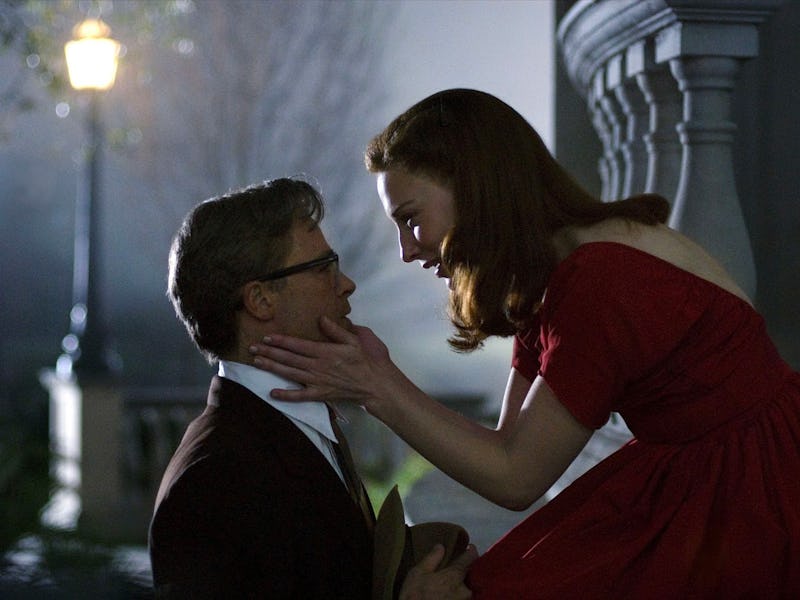David Fincher's Most Romantic Film Is Also His Most Devastating
Fincher isn’t usually known for warm and fuzzy feelings, but he embraces some romanticism in The Curious Case of Benjamin Button.

David Fincher is not a filmmaker whom many would associate with romance. You’re not left with many warm and fuzzy feelings after catching his gruesome take on the seven deadly sins, his cutthroat board room thriller, or treacherous take on a marriage story. Even his Christmas movies (more appropriately, the Fincher films that just so happen to release during the holiday season) are considered the “feel-bad” films of the year. And that’s as true for his take on The Girl with the Dragon Tattoo — the infamous bearer of that aforementioned title — as it is for its predecessor, The Curious Case of Benjamin Button.
However ironic the choice, the fact that these films are released during the most wonderful, whimsical time of the year speaks to a kind of optimism, maybe even a romanticism, in Fincher’s body of work. His appreciation for the odd love story might run deeper than you’d think, even if his most notable work takes a hatchet to romantic tropes whenever possible. That instinct to deconstruct a fairy tale romance is probably at its most benign in Benjamin Button, a film that’s long been considered the ugly duckling of Fincher’s dark, twisty oeuvre.
Perhaps it sticks out because it wields its softness almost like a badge of honor. Perhaps it’s been forgotten because its then-remarkable visual effects — doubling down on the uncanny work of George Lucas and Robert Zemekis — are now regarded with the same infamy as the Twilight saga’s CGI baby. Admittedly, seeing Brad Pitt’s face superimposed onto that of an 80-year-old man (who’s also meant to be a child) isn’t exactly comforting, nor is Cate Blanchett’s occasionally air-brushed visage. But those surface-level slights are easy to forget once you get lost in the world of Fincher’s Southern gothic fable. Here, the director really is at his most romantic. Given its inherently macabre premise, though, The Curious Case of Benjamin Button is also Fincher at his most haunting.
Benjamin Button was, at one point, considered an unfilmable story. Hollywood has long labored to adapt its source material, a sliver of a short story by F. Scott Fitzgerald, into something tangible. By the time Fincher came aboard, scripts had passed from Steven Spielberg to Ron Howard to Charlie Kaufman and Spike Jonze, eventually landing with screenwriter Eric Roth. Benjamin Button takes on a (slightly) more wholesome bent with Roth penning its script: this is, after all, the writer of Forrest Gump. In a way, Button is its spiritual sequel, a meditation on death and its cyclical nature rather than a portrait of a fraught American era. And with Fincher at the helm, it takes on the qualities of a ghost story.
As the titular protagonist, Brad Pitt subverts his cool charisma to portray a man with a disturbing genetic ability. He is born an old man, and as he “ages,” he appears younger and younger, gaining strength and vitality while those around him grow older and eventually die. It’s a lonely way to live, and Benjamin carries that loneliness in him all his life, even as he forges increasingly intimate connections with those he meets on his adventures. Fincher’s trademark, washed-out palette only adds to the disconnect: Benjamin Button is filled with little love stories, episodic interludes that introduce one delicate, endearing dynamic after the next. When death comes, it’s one of the few constants in Benjamin’s life: dictating fate without any fuss, but leaving him (and the audience) both wistful and a little hollow.
Benjamin Button’s uncanny life is strengthened by his relationship with Daisy, however tragic it ends up being.
The film is inarguably about Benjamin and his uncanny existence, but it’s all contextualized through Daisy (Blanchett), the great love of his life. Benjamin Button opens with Daisy on her death bed in a New Orleans hospital, recounting Benjamin’s journals with her daughter (Julia Ormond) as Hurricane Katrina roils off the coast. It’s through Daisy that we properly feel the events of the film, that we experience some much-needed catharsis.
Daisy first meets Benjamin as a child, and though he’s technically her own age, his Father Time façade casts an icky pallor over their first encounter. As she matures, Benjamin gains his youth, and the pair pass like ships in the night, over and over, until each look and feel the same age. “We finally caught up with each other,” Benjamin tells her later. He’s 49; she’s 43 — clinging a bit to the prime of her life as a ballet dancer, while Benjamin looks forward to a few more days of youth. He will, of course, eventually die. As will she. It’s as offbeat a definition of “bittersweet” as there ever was, and twice as devastating. But in the context of this world, it feels as natural as anything.